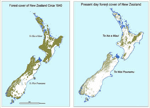

“The four-year Land Cover Research Programme will provide vital information about our rural and urban environment for the natural resources sector, regional councils and research organisations to use,” Smith said. “Using the best in modern technology, we can thoroughly map New Zealand’s changing land use so we can quantify the pressures on water quality and biodiversity.”
The Land Cover Research Programme will be led by Crown Research Institute Landcare Research, with the involvement of the Ministry for the Environment, the Department of Conservation, the Ministry of Agriculture & Forestry and regional councils. It will build on the Ministry for the Environment’s Land Use and Carbon Analysis System (LUCAS) developed to report New Zealand’s carbon emissions to the United Nations.
“Up-to-date information about vegetation, water sources and the built environment is critical for the success of natural resource industries such as agriculture and forestry,” said Mapp.